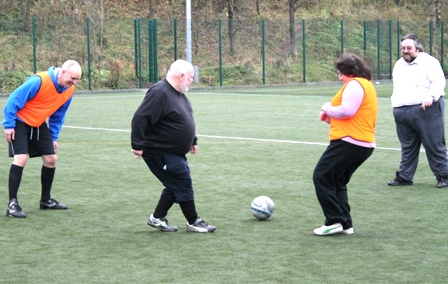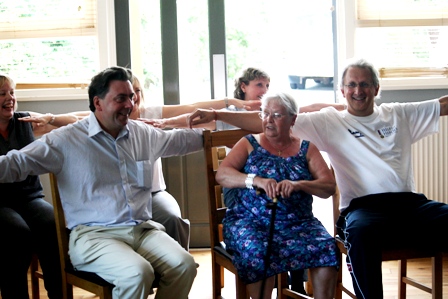
WellFit: discovering the health benefits of physical activity.
Local wellbeing for local people
When the editor of The Leisure Review was pondering an exploration of the wider physical activity landscape for the February issue Mick Owen opted to stay close to home and close to his heart by investigating ‘doorstep PA’.

WellFit: discovering the health benefits of physical activity.
Regular readers of this magazine will not need to be reminded of the particular charms of Glossop, a small town squashed in between the Greater Manchester conurbation and the Peak District National Park. Little of national note ever happens, although the football team did get to Wembley in the FA Vase in 2009, so it was a surprise and a delight to find a project based in the home of our northern office which is certainly on the physical activity wave if not actually ahead of it.
WellFit Health & Wellbeing CIC is a small social enterprise set up last year to service one specific project but which is now, given the shifting sands in public health provision, looking to expand and develop its offer. One of its directors, local man Richard Thomas, is keen to explain where the company is coming from. “You can almost date the inception of WellFit from the Sport and Recreation Alliance’s 2011 conference, or more particularly to the article which followed it in TLR which covered the presentation given by Dr William Bird”. The article published in July that year outlines Bird’s argument that the NHS could prescribe physical activity rather than pharmaceuticals for a range of conditions and not only see better patient outcomes but also save money. “It’s a compelling case,” says Thomas “but not one which many GPs are listening to. We used the article, plus the excellent web-presentation from Canadian public health expert Dr Mike Evans, which argues for incremental increases in daily physical activity, to argue for some kind of local investment in what we had all come to know as PA.”
The seed corn investment needed was eventually found in one of Glossop’s smaller practices, the Cottage Lane surgery of Dr Alan Dow. Dow has long been an advocate of using “different routes back to health” and when funding became available the practice bid for and was successful in getting enough funding for a six-month pilot testing Bird’s and Jones’ assertions locally. Dow’s practice serves the Gamesley council estate of 1,300 houses. The area has the unfortunate distinction of being labelled the most deprived ward in the High Peak local authority area with, according to the local parish church, “39.5% of the community living on or below the Breadline (Breadline Index)”. The ward has consistently ranked in the 10% most deprived wards in the country and with poverty a key risk factor for ill health it is no surprise that the community Dr Dow serves has significantly higher poor health indicators than the national average.
Gillian Morgan, the nurse practitioner who led on what came to be called WellFit Gamesley wanted to see genuinely local interventions: “Our patients are very set in their ways and have difficulties leaving the estate. When the idea to use the local pub for sitting exercise was mooted, for example, I was really pleased. Not only is it local, it’s also familiar and using it emphasises that the sessions are social.”
The social aspect of the physical activity sessions which WellFit offer its clients is paramount, as is the language used to promote and deliver the sessions. “We want our clients to embed physical activity in their daily lives and that means both getting them in and then keeping them in,” explains Thomas. “Using the language of the Lycra-clad exercise fascists who populate too many parts of the fitness industry would be wholly counter-productive.” And with this he picks up his Blackberry and opens it to Twitter. “There you go,” he says in seconds. “This is about exercise buddies: ‘Find someone who will challenge you,’ and then the ubiquitous ‘Get active’. How about finding people who will ‘support you’ and then drop the shouty bit at the end? We don’t all want to get sweaty and ‘smash’ 10k training runs, you know.”
Thomas clearly has an issue with mainline fitness providers and when asked to explain where the WellFit approach differs from familiar exercise referral programmes he is clear: “My beef is that it’s a one-size-fits-all approach. Gyms -- to use the generic term -- and the people who use them are designed for a certain type of consumer. The ‘ladies-who-lunch’ places can’t and don’t want to accommodate body builders and vice versa so when anyone new arrives at a gym, whatever its specialism, then it is them, the customer, who gets repackaged to fit, not the gym.” His argument is that if you don’t fit the target demographic of the facility to which you are referred the chances of you making any health gains using that facility are compromised.
Thomas recognises that exercise referral programmes will work for a percentage of patients who are happy to use mainstream fitness facilities, in particular “returners”, but he refers to the British Heart Foundation toolkit on exercise referral, which states: “Even though exercise referral schemes are popular throughout the UK, it is important to recognise that such schemes represent only one type of intervention that can be used by primary care professionals to promote physical activity for health gain. Self-directed unsupervised activities such as free swimming, gardening or lay led activities such as health walks, green gyms or supervised structured activities such as dance, tai-chi etc all contribute to the wider concept of physical activity promotion for disease prevention.”
WellFit Gamesley, the original small project, certainly fitted into the last of these categories using sitting exercise, very low-level walks and walking football to try to engage the Cottage Lane patients. In the first six months the project saw 50 patients referred. Of these, 20 either asked to be removed from the trial or simply did not attend. Weekly attendances over three sessions averaged 16.
Compared to the numbers crammed into a Zumba class or being beasted around your local park in search of the boot camp experience, these numbers may seem paltry but they reflect the population size and the numbers in the target group. More obvious has been the effect on regular attenders, which is marked. Every patient who completed a questionnaire and assessment before and after the trial period recorded an increase in their sense of wellbeing and practitioners noted specific improvements in balance, strength and range of movement. More importantly, the groups involved have all expressed the desire to continue with their new-found activity and the pressure to sustain the provision has led to the creation of the community interest company which is now maintaining all three sessions and looking to expand.
Thomas praised the support the project had received from Derbyshire County Council, High Peak Borough Council and even the local MP, Andrew Bingham, who just happens to be the new vice-chair of the parliamentary all party group on sport. “Both local councils have helped with grants and Andrew has been really supportive with helping us launch both the original project and the re-launched walking football session,” Thomas said. However, he reserves most of his praise for consultancy firm QFI Consulting who have funded the Gamesley element of the project from the end of the pilot through till Easter.
QFI director Helen Gibb explained why a company which works around the globe should support such a local initiative: “QFI is very keen to support community projects. A lot of our commercial work is in the health and social care setting and we see so often the immeasurable value to patients of having the opportunity and facilities to keep themselves active and healthy at home. We see this as a very important project to help our elderly community have fun in their lives and enjoy the benefits of good health and gives QFI the opportunity to meet its wish to support worthwhile community projects.”
It is a strength of the social enterprise model that companies like WellFit CIC can attract commercial partners without compromising their community objectives. With the responsibility for public health about to move from NHS structures into local authorities it remains to be seen if localised interventions such as the Gamesley project attract the support of commissioners or whether the precise specifications required prove too much of a barrier. Either way it would be nice to think that WellFit Health and Wellbeing will find a way to keep making a difference to a locality, and a community, which needs all the help it can get.
Mick Owen is the managing editor of The Leisure Review. In the interests of full disclosure we should point out that WellFit Health & Wellbeing CIC is part of the TLR Communications Group. Mr Owen is a director of the CIC.
The Leisure Review, February 2013
© Copyright of all material on this site is retained by The Leisure Review or the individual contributors where stated. Contact The Leisure Review for details.
Download a pdf version of this article for printing
